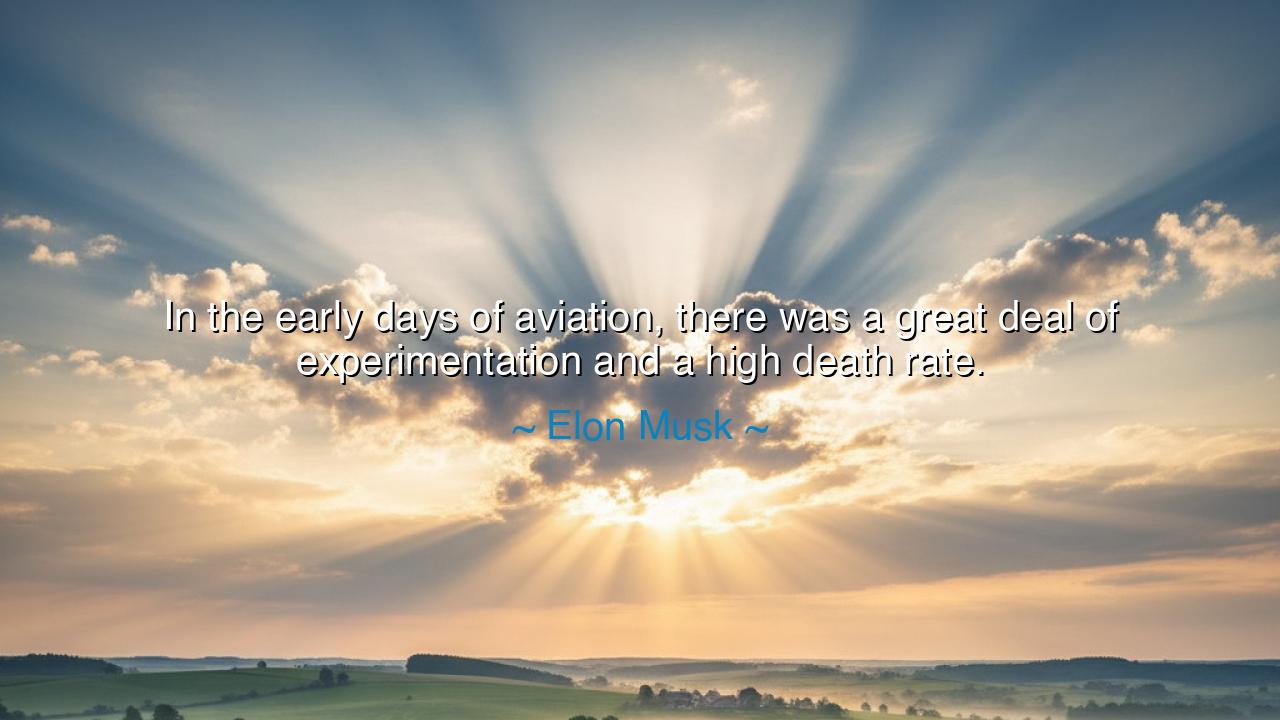
In the early days of aviation, there was a great deal of
In the early days of aviation, there was a great deal of experimentation and a high death rate.






In the sobering words of Elon Musk, we hear both warning and wisdom: “In the early days of aviation, there was a great deal of experimentation and a high death rate.” At first, these words appear as a simple reflection on history—but beneath them lies a deeper lesson about the cost of progress and the courage that fuels the human spirit. Musk, the modern pioneer of space exploration and technological revolution, invokes this truth not merely to recall the past, but to remind us that all great leaps forward demand both sacrifice and faith.
The origin of this quote comes from Musk’s reflections on the evolution of flight and its parallel to the challenges faced by the space industry today. In the early twentieth century, the dream of conquering the skies burned in the hearts of men like the Wright brothers, Otto Lilienthal, and Alberto Santos-Dumont. These were the first dreamers who dared to defy the earth’s pull. They built machines that looked like fragile birds and climbed into them with trembling hands and radiant hope. Yet for every success, there were countless failures—and many who never rose again from the fields and hills where they fell. To Musk, these early aviators embody the eternal truth that progress is written in the language of risk.
The early age of aviation was a time of wonder, but also of tragedy. Otto Lilienthal, the “Glider King,” made over two thousand flights in the 1890s, documenting the laws of lift and flight. One day, a gust of wind sent him crashing to the ground; his final words before death were, “Sacrifices must be made.” And indeed, his sacrifice became the foundation for others to soar. The Wright brothers, studying his work, carried forward his dream. When their fragile Flyer first lifted off at Kitty Hawk in 1903, the world changed forever. But it was not luck that carried them into the air—it was the willingness to fail, to endure danger, and to learn from disaster.
Musk’s reflection, then, is not a mere historical note—it is a philosophy of innovation. When he speaks of “a high death rate,” he is not glorifying loss, but acknowledging reality: that those who tread new paths walk on perilous ground. His own ventures, from SpaceX to Tesla, echo this same spirit of experimentation. Rockets have exploded; prototypes have failed. Yet through each failure, knowledge is gained, and the frontier advances. Just as the early aviators built the foundation for modern flight, today’s dreamers build the bridge toward the stars. Courage and perseverance, not comfort and safety, are the true engines of progress.
This truth extends beyond science—it belongs to all human striving. Every great art, invention, or transformation begins in uncertainty. Those who fear failure will never create what endures. The ancients knew this: the blacksmith burns his hand before mastering the forge; the sailor braves the storm before he learns the sea. Musk’s words remind us that every era has its pioneers, and every pioneer must pay a price. Yet it is through their daring that the world is remade, and through their sacrifice that humanity ascends.
The lesson, then, is this: do not be afraid to begin where others have fallen. Embrace the failures that teach, for they are the true architects of wisdom. If you would build something worthy of the future, expect hardship; if you would rise above the earth, you must first make peace with gravity. The great innovators of history were not immune to loss—they were defined by their refusal to let loss be the end. Musk’s words call us to that same faith: to strive onward even when the winds are against us.
So, my children, remember the message hidden in this reflection. The skies were not conquered by the timid, nor will the stars be reached by those who fear to dream. When you stumble, think of Lilienthal; when you fail, remember Kitty Hawk. Every fall brings you closer to flight. Every experiment, even the ones that end in ashes, brings humanity nearer to the impossible. Dare greatly, learn humbly, and rise again—and someday, those who come after you will stand upon the firm ground your courage has made.






AAdministratorAdministrator
Welcome, honored guests. Please leave a comment, we will respond soon